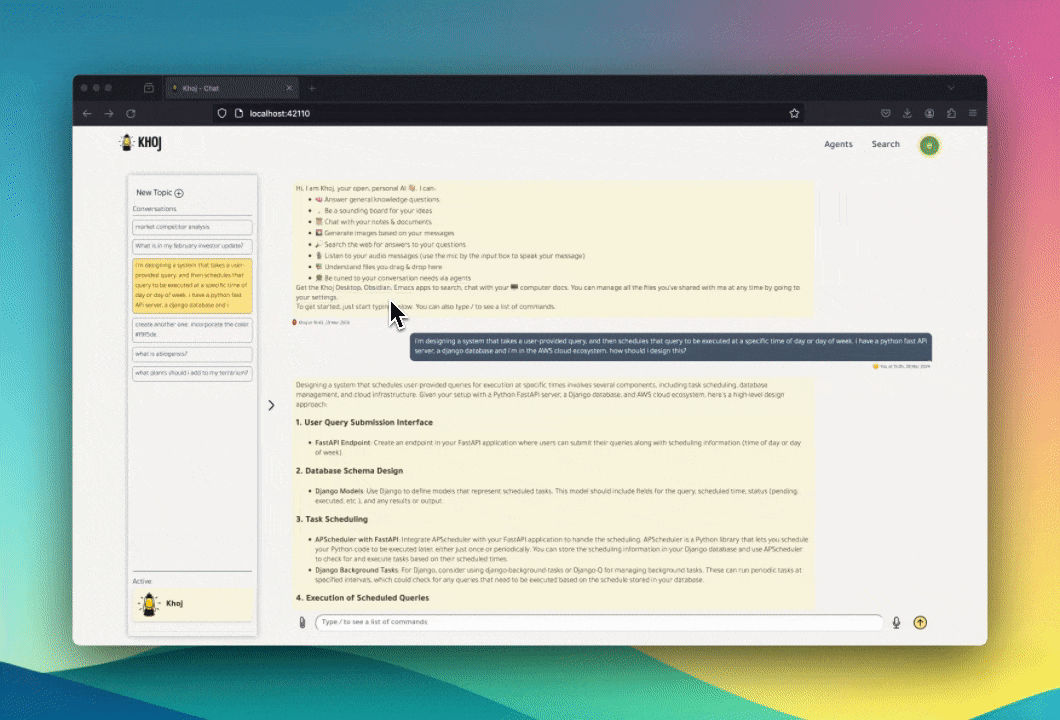AI Tutors: Hyper-Personalized Education
Students are being left behind
Being a good educator is one of the most difficult roles in society. Teaching one student alone is challenging, let alone a whole classroom. Classrooms tend to be overflowing with students, and educators tend to be overworked and way undervalued.
In the end, this hurts student outcomes. Being afraid to ask questions, not being able to keep up, and not having the individualized attention they need, many students end up falling behind. With advancements in AI assistive technology, we’re starting to close this gap.
Scaling out personalized education
Khoj enables people to share their own data with their personal AI. In turn, they can then have a dedicated agent that knows and understands their context. One of the most promising applications of this is in education.
The way students engage with information and course material is fundamentally changing. The traditional methods of reading textbooks and typing out essays are becoming obsolete. AI agents are essentially allowing us to take the flipped classroom method a step further by providing better teaching assistants at home. This is absolutely brilliant because it can help mitigate the ever-increasing educator shortage and drive better outcomes for students, of all ages and backgrounds.
However, it’s important to approach this next iteration of the classroom experience with a degree of experimentation and humility. Transparency is critical for understanding how young minds are intersecting with new, novel, potentially life-changing technology. That’s why being open-source and implementing prompt transparency is so critical. It helps demistify AI systems. AI is a piece of technology meant to help us live, work, and learn better. It should be used and understood as such. It shouldn’t be a black box.
Honestly, it’s tricky navigating this terrain. Some universities and schools are trying to label the use of generative AI as an academic integrity violation, while others are acknowledging that there’s very little we can actually do. We’re going to have to rethink how education is administered, and what values we encourage future generations to embrace.
At its core, we need to remember that using AI agents isn’t about getting answers. It’s about empowering students to ask better questions, and to understand the material more deeply.
And remember, the AI is not always going to be accurate. These models are fairly smart, but they still hallucinate.
Use Khoj as a study aid
If you’re a student, you can use Khoj to help you study. Here’s how:

- Clarify your doubts. Khoj offers a safe space to ask all your questions and drill into the concepts that still aren’t quite making sense. There’s no need to feel embarassed even going over the basics. No judgments, no office hours. It’s always available.
- Share your study material. You can upload PDFs of your syllabus or the coursework directly with Khoj to get better contextual responses. This makes it easier to prepare for your exams or homework.
- Use a more specialized agent. Out-of-the-box AI agents need to be given a good deal of supplementary data and prompting overhead to start being useful to you. You can mitigate some of this maintenance by using a more specialized agent, like Teacher or Professor. These are already tuned to help you learn & understand concepts, without directly handing you answers. Using a specialized agent is an easier way to align the AI’s behavior to your needs.
- Generate test questions. Get a better understanding of where your ability level is by having the agent create questions that test your knowledge. If you’re getting questions wrong, drill deeper and figure out where there might be gaps in your mental model.
- Get help from your actual teachers. After clarifying concepts with Khoj, you can approach your instructors with deeper questions.
Assistive agents work great for testing science concepts (physics, chemistry, biology), history, English, economics, programming, math theory, and other topics. They’ll still fall short in more quantitative subjects, like applied math.
AI agents are a great way to augment your self-studying at home or in groups, but there’s still abundant value in having the classroom setting, and real teachers/professors who are engaging with you in adaptive, interactive ways. It’s important to understand the limitations of how far an AI-first model might take you.
If you’re a teacher curious about AI or have other requests for agents, please drop us a message at [email protected].